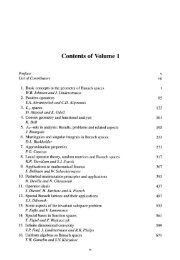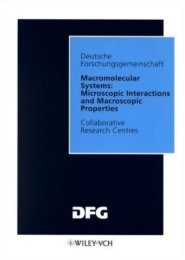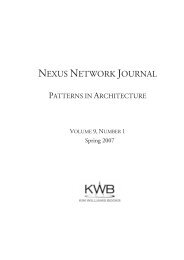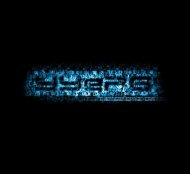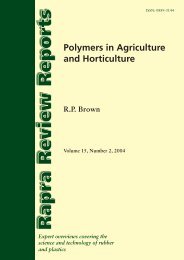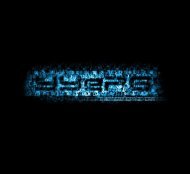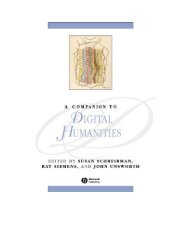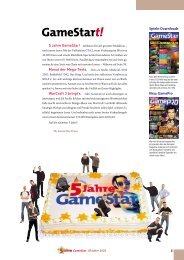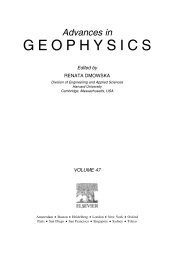- Page 1: Evolution and Optimum Seeking Hans-
- Page 4 and 5: vi Multiple Data) machines with man
- Page 6 and 7: viii 3.2.1.6 Complex Strategy of Bo
- Page 10 and 11: 2 Introduction situation calls for
- Page 12 and 13: 4 Introduction iterative optimizati
- Page 14 and 15: 6 Problems and Methods of Optimizat
- Page 16 and 17: 8 Problems and Methods of Optimizat
- Page 18 and 19: 10 Problems and Methods of Optimiza
- Page 20 and 21: 12 Problems and Methods of Optimiza
- Page 22 and 23: 14 Problems and Methods of Optimiza
- Page 24 and 25: 16 Problems and Methods of Optimiza
- Page 26 and 27: 18 Problems and Methods of Optimiza
- Page 28 and 29: 20 Problems and Methods of Optimiza
- Page 30 and 31: 22 Problems and Methods of Optimiza
- Page 32 and 33: 24 Hill climbing Strategies and Vog
- Page 34 and 35: 26 Hill climbing Strategies This pr
- Page 36 and 37: 28 Hill climbing Strategies of favo
- Page 38 and 39: 30 Hill climbing Strategies fk = fk
- Page 40 and 41: 32 Hill climbing Strategies should
- Page 42 and 43: 34 Hill climbing Strategies They re
- Page 44 and 45: 36 Hill climbing Strategies parabol
- Page 46 and 47: 38 Hill climbing Strategies where a
- Page 48 and 49: 40 Hill climbing Strategies x 2 c a
- Page 50 and 51: 42 Hill climbing Strategies The alg
- Page 52 and 53: 44 Hill climbing Strategies of dire
- Page 54 and 55: 46 Hill climbing Strategies Step 10
- Page 56 and 57: 48 Hill climbing Strategies Wood, a
- Page 58 and 59:
50 Hill climbing Strategies for con
- Page 60 and 61:
52 Hill climbing Strategies (5) (0)
- Page 62 and 63:
54 Hill climbing Strategies Rosenbr
- Page 64 and 65:
56 Hill climbing Strategies No geom
- Page 66 and 67:
58 Hill climbing Strategies of fact
- Page 68 and 69:
60 Hill climbing Strategies (1) (2)
- Page 70 and 71:
62 Hill climbing Strategies inequal
- Page 72 and 73:
64 Hill climbing Strategies Step 9:
- Page 74 and 75:
66 Hill climbing Strategies A disti
- Page 76 and 77:
68 Hill climbing Strategies and tho
- Page 78 and 79:
70 Hill climbing Strategies with th
- Page 80 and 81:
72 Hill climbing Strategies Step 1:
- Page 82 and 83:
74 Hill climbing Strategies i = @2
- Page 84 and 85:
76 Hill climbing Strategies s (k) =
- Page 86 and 87:
78 Hill climbing Strategies converg
- Page 88 and 89:
80 Hill climbing Strategies Step 2:
- Page 90 and 91:
82 Hill climbing Strategies McCormi
- Page 92 and 93:
84 Hill climbing Strategies or dete
- Page 94 and 95:
86 Hill climbing Strategies
- Page 96 and 97:
88 Random Strategies Random directi
- Page 98 and 99:
90 Random Strategies in order to pr
- Page 100 and 101:
92 Random Strategies rearranging Eq
- Page 102 and 103:
94 Random Strategies knowledge of t
- Page 104 and 105:
96 Random Strategies problem struct
- Page 106 and 107:
98 Random Strategies convergence ra
- Page 108 and 109:
100 Random Strategies surpass the c
- Page 110 and 111:
102 Random Strategies (1972), and P
- Page 112 and 113:
104 Random Strategies
- Page 114 and 115:
106 Evolution Strategies for Numeri
- Page 116 and 117:
108 Evolution Strategies for Numeri
- Page 118 and 119:
110 Evolution Strategies for Numeri
- Page 120 and 121:
112 Evolution Strategies for Numeri
- Page 122 and 123:
114 Evolution Strategies for Numeri
- Page 124 and 125:
116 Evolution Strategies for Numeri
- Page 126 and 127:
118 Evolution Strategies for Numeri
- Page 128 and 129:
120 Evolution Strategies for Numeri
- Page 130 and 131:
122 Evolution Strategies for Numeri
- Page 132 and 133:
124 Evolution Strategies for Numeri
- Page 134 and 135:
126 Evolution Strategies for Numeri
- Page 136 and 137:
128 Evolution Strategies for Numeri
- Page 138 and 139:
130 Evolution Strategies for Numeri
- Page 140 and 141:
132 Evolution Strategies for Numeri
- Page 142 and 143:
134 Evolution Strategies for Numeri
- Page 144 and 145:
136 Evolution Strategies for Numeri
- Page 146 and 147:
138 Evolution Strategies for Numeri
- Page 148 and 149:
140 Evolution Strategies for Numeri
- Page 150 and 151:
142 Evolution Strategies for Numeri
- Page 152 and 153:
144 Evolution Strategies for Numeri
- Page 154 and 155:
146 Evolution Strategies for Numeri
- Page 156 and 157:
148 Evolution Strategies for Numeri
- Page 158 and 159:
150 Evolution Strategies for Numeri
- Page 160 and 161:
152 Evolution Strategies for Numeri
- Page 162 and 163:
154 Evolution Strategies for Numeri
- Page 164 and 165:
156 Evolution Strategies for Numeri
- Page 166 and 167:
158 Evolution Strategies for Numeri
- Page 168 and 169:
160 Evolution Strategies for Numeri
- Page 170 and 171:
162 Evolution Strategies for Numeri
- Page 172 and 173:
164 Evolution Strategies for Numeri
- Page 174 and 175:
166 Comparison of Direct Search Str
- Page 176 and 177:
168 Comparison of Direct Search Str
- Page 178 and 179:
170 Comparison of Direct Search Str
- Page 180 and 181:
172 Comparison of Direct Search Str
- Page 182 and 183:
174 Comparison of Direct Search Str
- Page 184 and 185:
176 Comparison of Direct Search Str
- Page 186 and 187:
178 Comparison of Direct Search Str
- Page 188 and 189:
180 Comparison of Direct Search Str
- Page 190 and 191:
182 Comparison of Direct Search Str
- Page 192 and 193:
184 Comparison of Direct Search Str
- Page 194 and 195:
186 Comparison of Direct Search Str
- Page 196 and 197:
188 Comparison of Direct Search Str
- Page 198 and 199:
190 Comparison of Direct Search Str
- Page 200 and 201:
192 Comparison of Direct Search Str
- Page 202 and 203:
194 Comparison of Direct Search Str
- Page 204 and 205:
196 Comparison of Direct Search Str
- Page 206 and 207:
198 Comparison of Direct Search Str
- Page 208 and 209:
200 Comparison of Direct Search Str
- Page 210 and 211:
202 Comparison of Direct Search Str
- Page 212 and 213:
204 Comparison of Direct Search Str
- Page 214 and 215:
206 Comparison of Direct Search Str
- Page 216 and 217:
208 Comparison of Direct Search Str
- Page 218 and 219:
210 Comparison of Direct Search Str
- Page 220 and 221:
212 Comparison of Direct Search Str
- Page 222 and 223:
214 Comparison of Direct Search Str
- Page 224 and 225:
216 Comparison of Direct Search Str
- Page 226 and 227:
218 Comparison of Direct Search Str
- Page 228 and 229:
220 Comparison of Direct Search Str
- Page 230 and 231:
222 Comparison of Direct Search Str
- Page 232 and 233:
224 Comparison of Direct Search Str
- Page 234 and 235:
226 Comparison of Direct Search Str
- Page 236 and 237:
228 Comparison of Direct Search Str
- Page 238 and 239:
230 Comparison of Direct Search Str
- Page 240 and 241:
232 Comparison of Direct Search Str
- Page 242 and 243:
234 Comparison of Direct Search Str
- Page 244 and 245:
236 Summary and Outlook tive functi
- Page 246 and 247:
238 Summary and Outlook methods for
- Page 248 and 249:
240 Summary and Outlook this, which
- Page 250 and 251:
242 Summary and Outlook α ∆ x’
- Page 252 and 253:
244 Summary and Outlook step length
- Page 254 and 255:
246 Summary and Outlook 2. Optimal
- Page 256 and 257:
248 Summary and Outlook recombinati
- Page 258 and 259:
250 References Ahrens, J.H., U. Die
- Page 260 and 261:
252 References Back, T. (1992b), Th
- Page 262 and 263:
254 References Beale, E.M.L. (1972)
- Page 264 and 265:
256 References Beyer, H.-G. (1994b)
- Page 266 and 267:
258 References Branin, F.H., Jr., S
- Page 268 and 269:
260 References Broyden, C.G. (1972)
- Page 270 and 271:
262 References Chichinadze, V.K. (1
- Page 272 and 273:
264 References Daniel, J.W. (1967b)
- Page 274 and 275:
266 References D'Esopo, D.A. (1956)
- Page 276 and 277:
268 References Erlicki, M.S., J. Ap
- Page 278 and 279:
270 References Fletcher, R. (1972d)
- Page 280 and 281:
272 References Gaidukov, A.I. (1966
- Page 282 and 283:
274 References Goll, R. (1972), Der
- Page 284 and 285:
276 References Hadamard, J. (1908),
- Page 286 and 287:
278 References Hildebrand, F.B. (19
- Page 288 and 289:
280 References Householder, A.S. (1
- Page 290 and 291:
282 References John, P.W.M. (1971),
- Page 292 and 293:
284 References Kiefer, J. (1953), S
- Page 294 and 295:
286 References Krasovskii, A.A. (19
- Page 296 and 297:
288 References Langton, C.G. (Ed.)
- Page 298 and 299:
290 References Ley ner, U. (1974),
- Page 300 and 301:
References 293 Meissinger, H.F., G.
- Page 302 and 303:
References 295 Moiseev, N.N. (Ed.)
- Page 304 and 305:
References 297 Neyman, J. (Ed.) (19
- Page 306 and 307:
References 299 Overholt, K.J. (1967
- Page 308 and 309:
References 301 Polyak, B.T. (1969),
- Page 310 and 311:
References 303 Ralston, A., H.S. Wi
- Page 312 and 313:
References 305 Rosen, R. (1967), Op
- Page 314 and 315:
References 307 Savage, J.M. (1966),
- Page 316 and 317:
References 309 Schwefel, H.-P. (198
- Page 318 and 319:
References 311 Soucek, B. and the I
- Page 320 and 321:
References 313 Strongin, R.G. (1971
- Page 322 and 323:
References 315 Tsypkin, Ya.Z. see a
- Page 324 and 325:
References 317 Wald, A. (1966), Seq
- Page 326 and 327:
References 319 Witt, U. (1992), Exp
- Page 328 and 329:
References 321 Zerbst, E.W. (1987),
- Page 330 and 331:
JIMA Journal of the Institute of Ma
- Page 332 and 333:
Appendix A Catalogue of Problems Th
- Page 334 and 335:
Test Problems for the Second Part o
- Page 336 and 337:
Test Problems for the Second Part o
- Page 338 and 339:
Test Problems for the Second Part o
- Page 340 and 341:
Test Problems for the Second Part o
- Page 342 and 343:
Test Problems for the Second Part o
- Page 344 and 345:
Test Problems for the Second Part o
- Page 346 and 347:
Test Problems for the Second Part o
- Page 348 and 349:
Test Problems for the Second Part o
- Page 350 and 351:
Test Problems for the Second Part o
- Page 352 and 353:
Test Problems for the Second Part o
- Page 354 and 355:
Test Problems for the Second Part o
- Page 356 and 357:
Test Problems for the Second Part o
- Page 358 and 359:
Test Problems for the Second Part o
- Page 360 and 361:
Test Problems for the Second Part o
- Page 362 and 363:
Test Problems for the Second Part o
- Page 364 and 365:
Test Problems for the Second Part o
- Page 366 and 367:
Test Problems for the Second Part o
- Page 368 and 369:
Test Problems for the Third Part of
- Page 370 and 371:
Test Problems for the Third Part of
- Page 372 and 373:
Test Problems for the Third Part of
- Page 374 and 375:
Appendix B Program Codes This appen
- Page 376 and 377:
(1 + 1) Evolution Strategy EVOL 369
- Page 378 and 379:
(1 + 1) Evolution Strategy EVOL 371
- Page 380 and 381:
(1 + 1) Evolution Strategy EVOL 373
- Page 382 and 383:
( , ) Evolution Strategies GRUP and
- Page 384 and 385:
( , ) Evolution Strategies GRUP and
- Page 386 and 387:
( , ) Evolution Strategies GRUP and
- Page 388 and 389:
( , ) Evolution Strategies GRUP and
- Page 390 and 391:
( , ) Evolution Strategies GRUP and
- Page 392 and 393:
( , ) Evolution Strategies GRUP and
- Page 394 and 395:
( + ) Evolution Strategy KORR 387
- Page 396 and 397:
( + ) Evolution Strategy KORR 389
- Page 398 and 399:
( + ) Evolution Strategy KORR 391
- Page 400 and 401:
( + ) Evolution Strategy KORR 393
- Page 402 and 403:
( + ) Evolution Strategy KORR 395
- Page 404 and 405:
( + ) Evolution Strategy KORR 397
- Page 406 and 407:
( + ) Evolution Strategy KORR 399
- Page 408 and 409:
( + ) Evolution Strategy KORR 401
- Page 410 and 411:
( + ) Evolution Strategy KORR 403
- Page 412 and 413:
( + ) Evolution Strategy KORR 405
- Page 414 and 415:
( + ) Evolution Strategy KORR 407
- Page 416 and 417:
( + ) Evolution Strategy KORR 409
- Page 418 and 419:
( + ) Evolution Strategy KORR 411
- Page 420 and 421:
( + ) Evolution Strategy KORR 413
- Page 422 and 423:
Appendix C Programs C.1 Contents of
- Page 424 and 425:
Running the C Programs 417 any othe
- Page 426 and 427:
Description of the Programs 419 The
- Page 428 and 429:
Examples 421 To inform all problems
- Page 430 and 431:
Examples 423 course, any function o
- Page 432 and 433:
Index 425 Index Aarts, E.H.L., 161
- Page 434 and 435:
Index 427 Broyden-Fletcher-Shanno f
- Page 436 and 437:
Index 429 DFP-Stewart strategy, 78{
- Page 438 and 439:
Index 431 Friedberg, R.M., 102, 152
- Page 440 and 441:
Index 433 Householder method, 57 Ho
- Page 442 and 443:
Index 435 Levy, A.V., 70, 78, 81 Le
- Page 444 and 445:
Index 437 Newton, I., 2, 14 Newton
- Page 446 and 447:
Index 439 Random exchange step, 88,
- Page 448 and 449:
Index 441 Shah, B.V., 67, 68 Shanno
- Page 450 and 451:
Index 443 Turning point, see saddle




